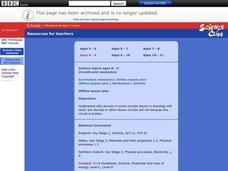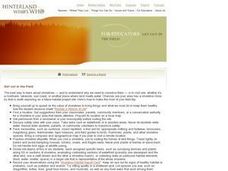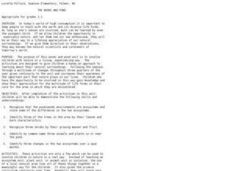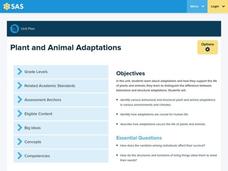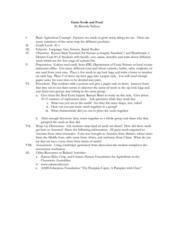Curated OER
Changing State
Pupils identify the changing states of water, water vapor and ice in the water cycle They investigate how each of these stages can be reversible. Students complete a worksheet describing the water cycle.
Curated OER
Circuits And Conductors
Students predict the common classroom items, such as paper clips, chalk, keys, or erasers, that will be good conductors in a circuit. They build circuits using a variety of circuit diagrams to test their predictions.
Curated OER
Violets, Daffodils, Roses and Thorn
Fourth graders complete a variety of exercises and activities surrounding the scientific and artistic properties of the parts and processes of a plant/flower.
Curated OER
Parasites: Our Tiny Companions
Students consider parasites that seek human hosts. They prepare nutrient agar plates and cultivate samples of bacteria taken from their own bodies. They experiment with disinfectants and soaps to determine which method kills the most...
Curated OER
Do You See What I See?
Students hypothesize the role of rocks, soil, and water by observing a terrarium and create a model to explore the water cycle. This is part of a five station set up.
Curated OER
There Are Algae in Your House!
Students demonstrate that, although we sometimes can neither smell nor taste them, many ingredients in our foods and household products come from the sea. They also investigate food eat to determine algae derivatives they contain.
Curated OER
Get Out in the Field
Pupils visit a shoreline--of an ocean, a lake, a pond, a riverbank, etc., survey it and record what they find there. They map the shoreline and surrounding area and conclude where potential waterfront projects could occur.
Curated OER
Fresh or Salty?
Students explore water bodies on the planet Earth and their various uses and qualities. They examine several ways that engineers are working to maintain and conserve water sources and think about their role in water conservation....
Curated OER
Mud Fossils
Learners create their own fossils in an activity using plaster of paris and a variety of objects which can be fossils, e.g. chicken bones, twigs, shells, etc. After making their fossils, they allow them to dry and discuss time and its...
Curated OER
The Woods and Pond
Young scholars participate in hands-on activities to explore their natural surroundings. They recognize that ponds and woods are ecosystems and compare differences between the two. They identify trees by their bark and leaves.
Curated OER
"To Terraform or Not to Terraform?"
Students analyze an article written by an engineer at NASA proposing colonizing Mars with human explorers on the fastest track possible. They are invited to react to the article through several activities.
Curated OER
Truth or Consequences
In this energy conservation worksheet, students answer questions about energy sources and energy use. The worksheet includes both true/false and multiple choice questions. There are 22 questions with answers.
Curated OER
Learning About Mammals
Students study the mammal classification and forms of them living in the United States. In this mammal study lesson, students read through orders of mammals that exist in the United States. Students also study the taxonomy of an eastern...
Pennsylvania Department of Education
Plant and Animal Adaptations
Fourth graders identify behavioral and structural adaptations to plant and animal life. In this unit overview, 4th graders discuss the importance of variation and adaptation in a species survival. This is a unit overview and does not...
Curated OER
Ocean in a Bottle
Students create an enclosed ocean in a bottle and add different pollutants to explore the effects of pollution on the environment.
Curated OER
Aquatic Communities
Students watch a video about aquatic communities. They conduct an experiment that shows how movement of rivers change the landscape. They compare fresh and salt water communities and its wildlife.
Curated OER
Grain Seeds and Food
Students observe the characteristics of different seed types. They classify, sort, name and write about the seeds.
Curated OER
Insect Unit
Fourth graders study the lives, and features of insects in the series of lessons that make up this unit.
Curated OER
Energy Defined
Fourth graders complete activities to study the sources of energy and forms. In this energy lesson, 4th graders discuss the origin of energy and define it. Students participate in several experiments to further study energy including a...
Curated OER
Riparian: The Guardian of the Waterways
Students become educated on what a riparian is, the need for riparian, and how a riparian corridor (forest, habitat) can protect waterways. Students construct dioramas depicting riparian habitats.
Curated OER
North Carolina State Vegetable -- Day 2
Students are introduced to the state vegetable of North Carolina, the sweet potato. In groups, they create their own sweet potato person using the items from a Mr. Potato Head. They write a summary of their person and a narrative about...
Curated OER
The Paleozoic Era Crossword
In this Paleozoic Era worksheet, students complete a 12 word crossword puzzle using given clues about the Paleozoic Era. Answers given on page 2.
Curated OER
Termite Trails
Students observe the behavior of termites and draw conclusions about their behavior. They record data as to termite behavior and recognize elements in the experimental design which must include a hypothesis.
Curated OER
Air-Plant Interaction
First graders observe, measure, and predict the growth of bean seedlings. They construct graphs of their findings after altering the temperature of the air for the seedlings. They deduct what would happen if the temperature was much lower.



